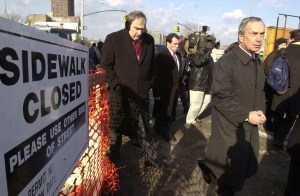 Tuesday’s hearing on the 421-a Property Tax Exemption Program almost didn’t happen.
Tuesday’s hearing on the 421-a Property Tax Exemption Program almost didn’t happen.
“When we mailed out the notice and we reached out to a lot of people, there was almost no response,” Vito Lopez, chairman of the state Assembly’s housing committee, said. “So it’s quite interesting.”
At issue was whether 421-a, which gives tax breaks to developers who build affordable housing and which expires at the end of this year, was worth renewing. Mr. Lopez, his Assembly colleague Rory Lancman and the five witnesses who testified all spoke in support of the tax credit program. Tempers flared, though, over the details of 421-a and the circumstances under which it should apply. Mr. Lopez strongly criticized Brooklyn’s “gold coast” and pushed for the required percentage of affordable housing in new buildings to be increased to 30 percent.
“There are units for people making a hundred or more,” he said in an opening statement. “There are almost no units for people making thirty, forty and fifty thousand.”
Rafael Cestero, commissioner for the city Department of Housing Preservation and Development, expressed his support of 421-a and proposed a series of minor amendments, such as a clarified definition for commencement of construction and a more streamlined application process.
In response, Mr. Lopez proposed still further amendments, such as increasing the required percentage of affordable units in a building from 20 to 30 percent. He admitted that the higher figure would “have a lot of developers committing hara-kiri.”
Mr. Cestero sympathized with the spirit of Mr. Lopez’s proposal but remained evasive, saying, “We don’t have to build that housing under every program.” He said 421-a is “just one tool in the toolbox to create affordable housing.”
Ever skeptical of for-profit developers, Mr. Lopez cautioned against the way developers have used 421-a in a way contrary to his own affordable housing ideals. He ranted against what he saw as “the consequences of, say, 421-a and a policy of a massive displacement in gentrification,” bemoaning what he called the new “gold coast” of Williamsburg. He expressed horror, later in the hearing, at the fact that some developers have actually appropriated his term “gold coast” in their branding. “These are all wealthy people. They’re not the indigenous people,” he said. “Some people will clap and applaud that, but someone has to give support to the person that makes only $20,000.”
Stephen Levin, council member of Brooklyn’s 33rd district, who testified next, echoed Mr. Lopez’s ideals, saying, “We do not need any more luxury housing built without paying property taxes.”
Mr. Lopez agreed. “I can’t live in most of my district,” he said. He then playfully accused Mr. Levin of perpetuating the pernicious gentrification. “You almost caused it when you came to the district. You lived in one of these apartments with four friends,” Mr. Lopez said. “I don’t know what we can do about that.”
To make his position clear, Mr. Levin said the “exclusion zone,” or the area in which 421-a applies, should be expanded to the entire city, a move that would eliminate tax breaks for buildings that don’t include affordable housing.
The big storm came after the testimony of Michael Slattery, senior vice president of the Real Estate Board of New York. Mr. Slattery said that an additional cut to developers’ tax burdens, from 30 to 12 percent, was the only way to get them to build more affordable housing. “We’re just looking for a shared burden to keep these units affordable,” he said.
But Mr. Lopez didn’t like Mr. Slattery’s attitude. He thought Mr. Slattery’s desire to further cut the taxes was unrealistic, and he accused REBNY of being too focused on profit. “Become a little bit more humanitarian,” he said. “You’re asking some tough stuff here.”
When Mr. Slattery addressed the now-defunct negotiable certificate program, which allowed affordable housing developers to sell tax rebates to market-rate developers, Mr. Lopez exploded. “I try to have a working relationship with you,” he said. “Give me some respect. That was driven solely by exorbitant profit margins. It was outrageous. Totally outrageous.”
He got particularly inflamed over Williamsburg’s New Domino development: “Everything is more money. Greater profit margin. Is that what government is supposed to do? Guarantee greater profit margin? Segregate people? Racially divide people? I mean, this is what you’re talking about.”
The chairman later apologized for his outburst, saying it was motivated by passion.
After two more witnesses testified, the hearing had raised provocative questions without hammering out many solutions.
“I don’t have all the answers,” Mr. Lopez said. “But I plan, God willing, to have a hearing in every borough in the next six months to talk about the creation of a 70-30 program and a moratorium on every other kind of development—and ask the city and state not to support anything but that. Now, you may say I’m going nuts. But we don’t need any more luxury development.”
walden@observer.com



